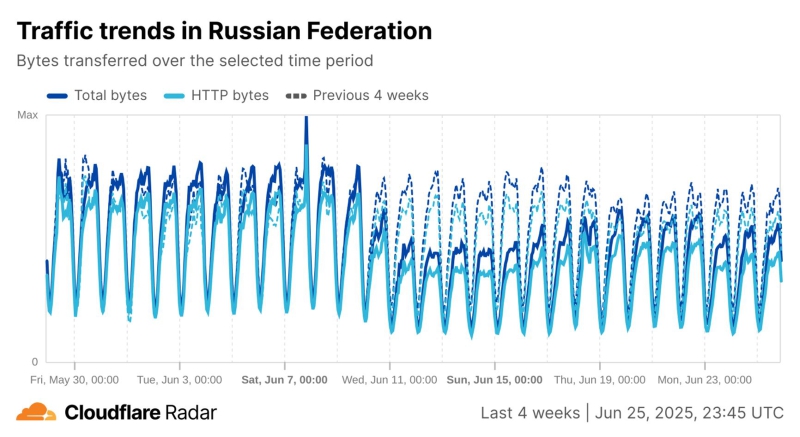Cloudflare's headquarters in San Francisco. Photo: Getty Images
U.S. tech company Cloudflare has confirmed that it is observing deliberate slowdowns from Russian internet providers, according to a blog post published by the company on June 26 cited by the independent outlet Mediazona.
Cloudflare, which offers a suite of services designed to ensure the availability and security of websites, is used by an estimated 20% of all websites on the internet.
Mediazona earlier reported in detail on the apparent throttling of Cloudflare services in Russia. According to Cloudflare Radar, traffic from Russia began to drop noticeably on June 9.

The slowdown appears to be implemented in such a way that only the first 16KB of data is allowed through. As a result, many small websites continue to function provided that their content fits within that limit.
On Thursday, Cloudflare publicly confirmed that it is seeing these disruptions and accused Russia of intentionally restricting access to its services.
“Cloudflare has not received any formal outreach or communication from Russian government entities about the motivation for such an action,” the company stated. “Unfortunately, the actions are consistent with longstanding Russian efforts to isolate the Internet within its borders and reduce reliance on Western technology by replacing it with domestic alternatives. Indeed, Russian President Vladimir Putin recently publicly threatened to throttle US tech companies operating inside Russia.”
The company also stated that because the slowdown is being imposed at the provider level, it is currently not possible “to restore reliable, high performance access to Cloudflare products and protected websites for Russian users in a lawful manner.”
“Access to a free and open Internet is critical for individual rights and economic development. We condemn any attempt to prevent Russian citizens from accessing it,” Cloudflare’s post concluded.
The Insider has reported extensively on the Russian government’s efforts to slow down various Internet-based services and communication platforms, including YouTube, WhatsApp, and Telegram. An investigation in October 2023 unearthed documents indicating that Russia had acquired equipment to block websites and apps based on the protocol they use.

